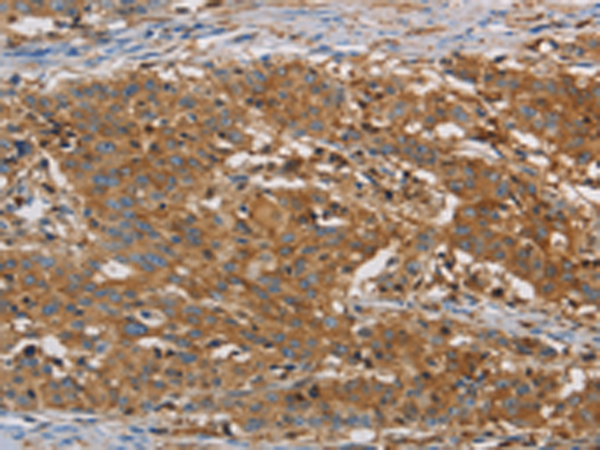
| WB | 咨询技术 | Human,Mouse,Rat |
| IF | 咨询技术 | Human,Mouse,Rat |
| IHC | 1/50-1/100 | Human,Mouse,Rat |
| ICC | 技术咨询 | Human,Mouse,Rat |
| FCM | 咨询技术 | Human,Mouse,Rat |
| Elisa | 1/10000 | Human,Mouse,Rat |
| Aliases | CFL |
| Host/Isotype | Rabbit IgG |
| Antibody Type | Primary antibody |
| Storage | Store at 4°C short term. Aliquot and store at -20°C long term. Avoid freeze/thaw cycles. |
| Species Reactivity | Human, Mouse, Rat |
| Immunogen | Fusion protein of human CFL1 |
| Formulation | Purified antibody in PBS with 0.05% sodium azide and 50% glycerol. |
+ +
以下是3篇关于NGF抗体的代表性文献摘要:
1. **文献名称**:*Tanezumab for the treatment of chronic pain*
**作者**:Mullard A
**摘要**:该文献综述了抗NGF单克隆抗体Tanezumab的临床研究进展,表明其在骨关节炎和慢性腰痛等疼痛治疗中具有显著效果,但需关注潜在副作用(如关节损伤风险)。
2. **文献名称**:*Anti-NGF therapy induces plasticity of sensory neurons and reduces neuropathic pain*
**作者**:Pezet S, McMahon SB
**摘要**:研究通过动物模型证明,抗NGF抗体可逆转神经病理性疼痛相关的神经元超兴奋性,揭示了其通过调控TrkA受体信号通路发挥治疗作用的机制。
3. **文献名称**:*Structural basis of NGF binding by anti-NGF antibodies*
**作者**:He XL et al.
**摘要**:通过X射线晶体学解析了抗NGF抗体与NGF蛋白的结合位点,阐明了抗体阻断NGF与TrkA/p75受体相互作用的分子机制,为优化抗体药物设计提供依据。
如需具体文献来源或补充更多研究,可进一步说明需求。
Nerve Growth Factor (NGF) is a neurotrophic protein critical for the development, survival, and function of sensory and sympathetic neurons. Discovered in the 1950s, NGF binds to tropomyosin receptor kinase A (TrkA) and the p75 neurotrophin receptor, regulating pain signaling, inflammation, and tissue repair. Dysregulated NGF signaling is implicated in chronic pain conditions (e.g., osteoarthritis, neuropathic pain), inflammatory diseases, and certain cancers. This led to the development of NGF-targeting antibodies as therapeutic agents.
NGF antibodies, typically monoclonal, block NGF-TrkA/p75 interactions, suppressing pain and inflammation. Preclinical studies demonstrated their efficacy in reducing hyperalgesia and neuronal sensitization. Clinical trials, particularly for osteoarthritis and chronic lower back pain, showed significant pain relief, positioning them as alternatives to opioids. Tanezumab, a humanized anti-NGF antibody, reached Phase III trials but faced setbacks due to adverse effects like rapidly progressive osteoarthritis.
Research continues to optimize safety and efficacy, exploring dose regimens and combination therapies. Despite challenges, NGF antibodies represent a promising class of biologics for pain management, especially in opioid-sparing strategies. Their development underscores the importance of neurotrophin biology in chronic disease mechanisms and highlights the potential of targeted antibody therapies in modulating pain pathways.
×